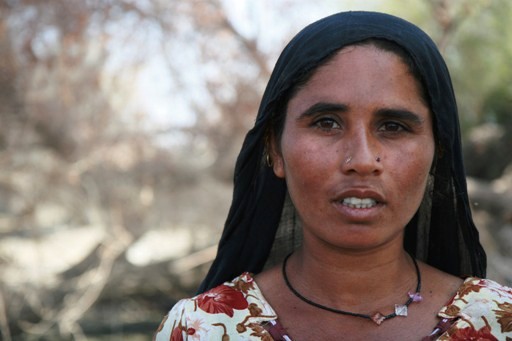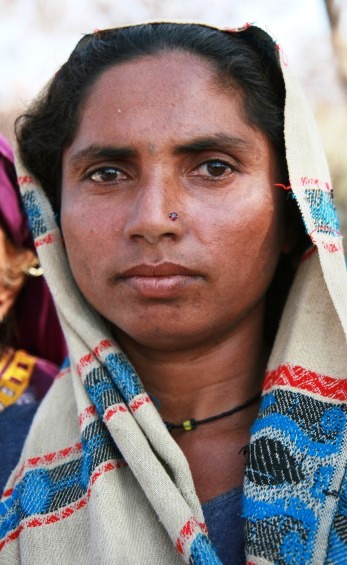Shortly after leaving the town of Dadu we are soon driving along roads cutting through miles and miles of land still under water...often as far as the eye can see. It takes two hours to reach the village of Sodhari Masijib. Along the way we see small scatterings of communities living on narrow pieces of land close to the road with their few possessions and scanty makeshift shelters...many just 'sleeping under the sky'.
To describe Sodhari Masijib as a village is a stretch of the imagination. Imagine a tidal river when the tide has gone out...and that's what people are living on. The smell is pretty much the same. Piled next to simple beds are people's belongings...desperately grabbed in the rush to leave before everything was swept away in the flood. Bags of clothing are damp, muddy and decaying. A broken television sits on top of one pile. No one has a shelter...the only covering is a mosquito net hung over one solitary bed.
There are no houses standing. 'Our houses have all gone all destroyed by the flood...we cried when we came back and saw the damage and the loss.' Says Habina (below) a young woman who comes up to greet us, 'We have lost our livelihoods. We have lost our houses... Our lives are in ruins...all our lives...everyone has lost everything. Now the children are getting many illnesses and many of them are sick.'
 Habina
Habina
Other women soon join us. We are the first organisation to come and see them, 'No one is helping us. You are the first people to come here and see how we are living and to ask about our needs.' Says Fatima. Conditions are grim. 'There are lots of flies and mosquitoes...there is malaria and the children are not sleeping easily because of all these insects. We have no nets to prevent malaria...and because we are sleeping under the sky the situation is worse. There are also many snakes so we are frightened for the children...there are no clinics or doctors near here.'
For the women there are further difficulties, 'We can't take baths and we don't have sanitary cloths. Our men ask us to take care because other people can see when we have our periods. It makes us feel shameful.' A statement any woman can relate to. Nawab goes on to tell me, 'There are no latrines here so we have to go early morning or late at night. If someone really has to go to the latrine during the daytime two other women go with her and cover her with a sheet. We feel shameful and we feel unsafe.' She adds, 'We also feel ashamed when people come and see us living like this because everything is dirty, dirty, dirty. It's impossible to keep clean in all this mud and dirt and there is only one hand pump working.'
 Nawab Zabi
Nawab Zabi
Before the flood there were three hundred families living here. The women reckon around half have returned. But what have they returned to? It's hard to imagine how they are coping.
'There is nothing we can do here' says Sakina, holding a very young baby, one of several amongst the group of women, 'We have no work. We have no tools. So we are sitting here and praying to God. We have some food...some wheat and rice we saved from last year's harvest. We are all farm labourers but there is no farming now...there are no other choices.' Before we leave I ask them if they have any questions...and I'm saddened by their response, 'You are educated. You come here with a notebook and can write down what we are saying. We have had no education...how can we ask you questions?' When encouraged Nawab simply says, 'Are you helping us?'
The one thing we try to avoid is raising expectations...there is a huge need throughout the country and Dadu is one of the worst effected areas. We tell them that we will be back soon with hygiene kits, which include sanitary clothes and soap, and we will try and provide other support.As we say good-bye Nawab has a last comment, 'We feel brave when people come and visit us...because it means we are not forgotten and that somehow our situation might change.' It's the 'We feel brave' that stays with me as we make our way back through the flooded landscape.
Oxfam is continuing to provide emergency water, sanitation and hygiene relief to families who are in camps, but now also in villages like Sodhari Masijib. With so many still needing so much, it is critical that governments around the world and the Government of Pakistan continue to provide humanitarian relief to the flood-affected people of Pakistan.
By Jane Beesly of Oxfam - November 2010